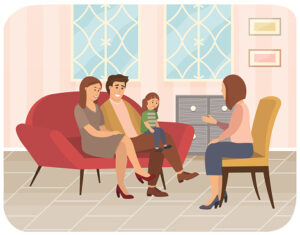If you are a parent who is struggling to connect with your child, you may want to consider PCIT therapy. PCIT, which stands for Parent-Child Interaction Therapy, is a type of therapy that can help improve communication and relationships between parents and children. This type of therapy has been shown to be very effective in helping children with behavioral problems. Additionally, it also helps in improving the overall relationship between parents and children. In this blog post, we will discuss the basics of PCIT therapy and how it can help improve your parenting skills!
Contents
Defining PCIT Therapy
 PCIT therapy, is a common abbreviation for Parent-Child Interaction Therapy. It is a two-phase treatment program designed to help improve the parent-child relationship.
PCIT therapy, is a common abbreviation for Parent-Child Interaction Therapy. It is a two-phase treatment program designed to help improve the parent-child relationship.
It is a rather recent and empirically-supported treatment, with the first PCIT program having been developed in the 1970s.
The therapy was designed to help treat children with externalizing behaviors, such as those who exhibited aggression, defiance, and destructiveness.
PCIT has also been found to be helpful for parents and children struggling with attachment issues. It is an evidence-based therapy, meaning that it has been shown to be effective in numerous studies. PCIT is considered a gold standard treatment for children with externalizing behavioral problems.
How Does It Work?
The therapy consists of two phases, the child-directed interaction (CDI) phase and the parent-directed interaction (PDI) phase.
The CDI phase is focused on the child and helping them feel loved and accepted by their parent. This phase includes activities such as playing games, reading stories, and engaging in other fun activities together. It encompasses two parts, skills training, and coaching.
- In the skills training portion of this phase, the therapist will teach the parents specific techniques that they can use to interact with their child in a more positive way. They will also learn how to effectively praise their child and give them attention.
- The coaching portion of this phase is where the therapist works with the parents and child together to help them practice the skills they have learned.
The PDI phase is focused on teaching the parents how to effectively discipline their child. This phase includes activities such as setting limits, giving instructions, and providing consequences for misbehavior. As with the CDI phase, it also consists of skills training and coaching.
- In the skills training portion of this phase, the therapist will teach the parents specific techniques that they can use to discipline their child in a more effective way. They will also learn how to effectively praise their child and give them attention.
- The coaching portion of this phase is where the therapist works with the parents and child together to help them practice the skills they have learned.
PCIT therapy is typically provided in weekly sessions that last for about an hour. It is usually provided over the course of 12-24 weeks, although this can vary depending on the needs of the family.
Who Should Consider It?
 Typically, PCIT is recommended for parents of children ages two to seven who are displaying externalizing behaviors, such as aggression, defiance, and destructiveness.
Typically, PCIT is recommended for parents of children ages two to seven who are displaying externalizing behaviors, such as aggression, defiance, and destructiveness.
It is also often recommended for parents and children who are struggling with attachment issues. PCIT has been found to be effective in treating a wide range of behavioral problems in children.
For example, PCIT has been found to be effective in reducing aggressive and defiant behaviors in children, as well as improving parent-child attachment.
Moreover, PCIT has been found to be an effective treatment for a variety of different problems. These can include ADHD, Oppositional Defiant Disorder, Conduct Disorder, Anxiety, Depression, and PTSD. PCIT has also been found to be effective with children who have been abused and/or neglected. This therapy can help in reducing the symptoms of these disorders and can help improve the parent-child relationship.
If you are a parent struggling to discipline your child effectively, or if your child is displaying externalizing behaviors, PCIT therapy may be a good option for you. It is an evidence-based therapy that has been shown to be effective in treating a wide range of issues.
What Are Its Benefits?
From the above information, we can determine the most prominent benefit of PCIT to be that it is an evidence-based therapy with a wide range of benefits. Some other benefits include:
- It can help to improve the parent-child relationship
- It can help to reduce problem behaviors in children, such as acting out, tantrums, and defiance.
- It can help to reduce stress in the family
- It can help to increase compliance and cooperation from children.
- It can help parents to learn new parenting skills
- It can help children to learn new behavioral skills
All these benefits make for a more positive family environment and can lead to better outcomes for the child as well as the parent.
Tips To Get The Most Out Of It
If you decide to try PCIT therapy, here are a few tips to help you get the most out of it:
- Make sure that all parties are on board. In order for PCIT to be effective, it is important that both the parents and the child are willing to participate in the therapy.
- Find a qualified therapist. It is important to find a therapist who is properly trained in PCIT and has experience working with families.
- Be prepared to commit to the therapy. This means attending all sessions and practicing the skills you learn in between sessions.
- Be open to trying new things. PCIT may be different from other parenting strategies you have tried in the past. However, it is important to keep an open mind and give it a chance.
- Be patient. Change takes time, so don’t expect miracles overnight. Stick with it and you will see the benefits in the long run.
- Lastly, also remember that therapy is not only about what happens in the therapy room. It is also about what happens when you leave. So, make sure to put the skills you learn into practice in your everyday life.
PCIT therapy can be a helpful tool for parents struggling to discipline their children effectively. It is an evidence-based therapy with a wide range of benefits that can help to improve the parent-child relationship and reduce problem behaviors in children. If you are considering PCIT therapy, be sure to find a qualified therapist and be prepared to commit to the therapy.
Conclusion
Conclusively, we can say that PCIT therapy is a beneficial form of therapy with a wide range of benefits. It serves an array of purposes such as helping to improve the parent-child relationship, reducing problem behaviors in children, and increasing compliance and cooperation from children. If you are considering PCIT therapy, be sure to keep in mind the tips mentioned above to get the most out of it.
If you or someone you know is looking for psychological help, Therapy Mantra is here for you. We are the leading providers of online therapy and counseling. Our team of highly trained and experienced therapists can provide assistance at the most affordable rates. Contact us today to learn more about our services. You may also visit our website to book an online therapy session or download our free Android or iOS app for more information.


